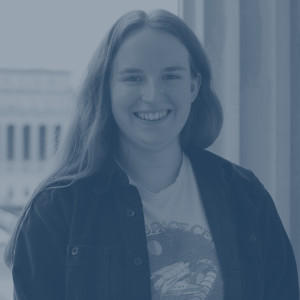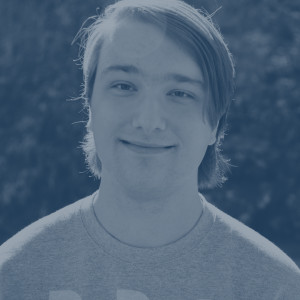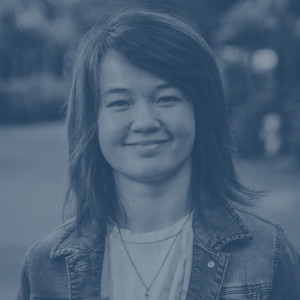Mara Hart, 20
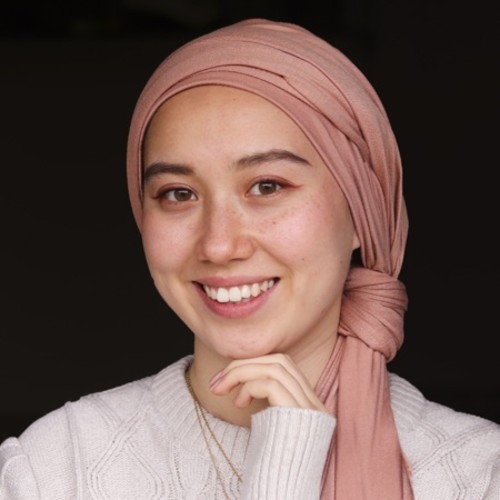
When Mara first got to college, she wasn’t sure about her Computer Science major. She explicitly chose the University of Virginia because of the good economics program they offered just in case she wanted to switch majors . She branched out into different groups, even joining ROTC for less than a month, thinking that the only way she could get a programming job was through the military. She felt as if she was barely getting a taste of what it meant to be a programmer. Coding classes just didn’t show her what it’s like to create a product.
But hackathons did.
Mara, like many young professionals hoping to start their career, felt intimidated by the coders in her immediate vicinity that rattled off tech jargon like ‘linked lists’ and ‘the terminal’. She had no idea of what these meant. After a semester of revising her resume, Mara heard whispers of hackathons, presented to her as a great opportunity to expand one's portfolio of personal projects. Luckily, an MLH sponsored hackathon, HooHacks, was just around the corner.
Mara applied, got accepted, and took to Facebook in hopes of finding the perfect group. Mara got some bites from fellow passionate hackers, and with her team of three total strangers, she hunkered down and got to work. The team consisted of two other first-timers and one hacker with 10 hackathons under their belt. Mara realized, with the help of this seasoned hacker, that you don’t become a programmer overnight.
There are, however, many people that used to be in her shoes and want to help guide and show others the path that worked for them. This taught her that whenever she may feel overwhelmed, she can find solace in the belief that as long as she is persistent in her learning, she can do it.
The team spent 36 hours crafting an app that works to simplify syllabi and calendar syncing. The project wound up winning Best Beginner, but Mara’s favorite memory of the event was taking caffeine-fueled, late-night walks with her teammates.
She swiftly felt impassioned to attend as many hacking events as possible, wherever they might take her. So far, she’s been able to travel across the country to Los Angeles for AthenaHacks and soon, she hopes to take her skills across the world.
AthenaHacks was an important moment for Mara. She and her friend, Danielle, decided to make the cross-country venture together to show what they had to offer. This was the perfect opportunity for the two friends, who had hopes of hosting their own hackathon soon after AthenaHacks took place, to gain insight into the world of hackathon management. They went into the event with the goal of going to workshops for the sake of seeing how they were run in mind, rather than brainstorming projects. Unfortunately, the COVID-19 pandemic resulted in a majority of the workshops going virtual or unmanned. But Mara took this as an opportunity to adapt her ideas to the situation.
The pair pivoted to project creation after the unforeseen circumstances. They took inspiration from the prize tracks and crowdsourced ideas that worked for the goal of “making the world a better place.” This resulted in Mara creating a resource hub for the sake of empowering child abuse survivors to reach out and find help. Using HTML, CSS, JS and Microsoft Azure, Mara learned that hackathons rewarded the idea and the creativity behind every project more than they did bountiful technological experience. A mentor of the event even extensively helped in the workshopping process to make sure every track had been covered. The project won not one, but three prizes. Mara enjoys citing this event when speaking with anyone who feels nervous or discouraged about their first hackathon. It’s intimidating, she knows. But hacking is about creating a product that is innovative and solves a real-world problem, not about who can code the fastest.
Outside of hackathons, Mara is founder and president of the Girls Who Code (GWC) college loop, one of the largest in the nation. The core belief is that hackers are anywhere we use technology to solve our problems—this guides the mission of GWC to build a community of hackers not limited to women and not limited to CS majors. GWC is the only diversity-focused coding organization on campus that has non-CS majors and men on the executive board. Mara has led the club in hosting networking events and workshops with companies such as Microsoft and Google.
GWC led Mara to fulfilling her dreams of hosting a hackathon only eight months after the organization coalesced. Mara worked hard to make sure that attendees of the hackathon felt as comfortable as she was made to feel when she first started, even creating a pre-hackathon jumpstart program with team building sessions, idea generation assemblies and general help gatherings.
Mara hopes to make even further steps to make tech a more gender-inclusive field, focusing on resources for young women and other gender/agender minorities. On top of GWC, she started a female-centric mentorship program at Microsoft as an intern after she learned that only 29% of the entire company was female. This percentage was even lower after magnifying Microsoft’s programming sector. In only a few weeks, the program gained traction and connected over 200 interns and full-time employees, bridging a very exposed gap in the system.
As a hacker, the process of creating self-projects in and out of the tech world drives Mara’s work ethic. Mara aspires to become a CS educator, and recently, she has been given the opportunity to teach as a MLH Coach where she leads MLH Localhost workshops and helps staff hackathons around the world. Her workshops, reaching a viewership of 500 members, allow her to hone her skill of entertaining while educating and learning the basics of new technologies that everyone should have access to. She credits the support of her professors, teachers, and mentors as a large part of how she has gotten where she is today, and she is excited to give back to the next generation of hackers.
Quick Facts
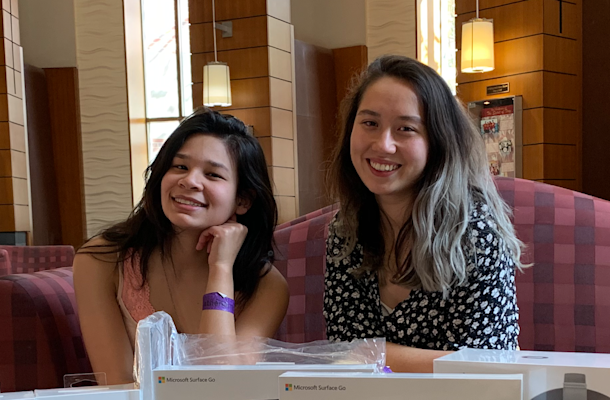
Mara Hart, 20

When Mara first got to college, she wasn’t sure about her Computer Science major. She explicitly chose the University of Virginia because of the good economics program they offered just in case she wanted to switch majors . She branched out into different groups, even joining ROTC for less than a month, thinking that the only way she could get a programming job was through the military. She felt as if she was barely getting a taste of what it meant to be a programmer. Coding classes just didn’t show her what it’s like to create a product.
But hackathons did.
Mara, like many young professionals hoping to start their career, felt intimidated by the coders in her immediate vicinity that rattled off tech jargon like ‘linked lists’ and ‘the terminal’. She had no idea of what these meant. After a semester of revising her resume, Mara heard whispers of hackathons, presented to her as a great opportunity to expand one's portfolio of personal projects. Luckily, an MLH sponsored hackathon, HooHacks, was just around the corner.
Mara applied, got accepted, and took to Facebook in hopes of finding the perfect group. Mara got some bites from fellow passionate hackers, and with her team of three total strangers, she hunkered down and got to work. The team consisted of two other first-timers and one hacker with 10 hackathons under their belt. Mara realized, with the help of this seasoned hacker, that you don’t become a programmer overnight.
There are, however, many people that used to be in her shoes and want to help guide and show others the path that worked for them. This taught her that whenever she may feel overwhelmed, she can find solace in the belief that as long as she is persistent in her learning, she can do it.
The team spent 36 hours crafting an app that works to simplify syllabi and calendar syncing. The project wound up winning Best Beginner, but Mara’s favorite memory of the event was taking caffeine-fueled, late-night walks with her teammates.
She swiftly felt impassioned to attend as many hacking events as possible, wherever they might take her. So far, she’s been able to travel across the country to Los Angeles for AthenaHacks and soon, she hopes to take her skills across the world.
AthenaHacks was an important moment for Mara. She and her friend, Danielle, decided to make the cross-country venture together to show what they had to offer. This was the perfect opportunity for the two friends, who had hopes of hosting their own hackathon soon after AthenaHacks took place, to gain insight into the world of hackathon management. They went into the event with the goal of going to workshops for the sake of seeing how they were run in mind, rather than brainstorming projects. Unfortunately, the COVID-19 pandemic resulted in a majority of the workshops going virtual or unmanned. But Mara took this as an opportunity to adapt her ideas to the situation.
The pair pivoted to project creation after the unforeseen circumstances. They took inspiration from the prize tracks and crowdsourced ideas that worked for the goal of “making the world a better place.” This resulted in Mara creating a resource hub for the sake of empowering child abuse survivors to reach out and find help. Using HTML, CSS, JS and Microsoft Azure, Mara learned that hackathons rewarded the idea and the creativity behind every project more than they did bountiful technological experience. A mentor of the event even extensively helped in the workshopping process to make sure every track had been covered. The project won not one, but three prizes. Mara enjoys citing this event when speaking with anyone who feels nervous or discouraged about their first hackathon. It’s intimidating, she knows. But hacking is about creating a product that is innovative and solves a real-world problem, not about who can code the fastest.
Outside of hackathons, Mara is founder and president of the Girls Who Code (GWC) college loop, one of the largest in the nation. The core belief is that hackers are anywhere we use technology to solve our problems—this guides the mission of GWC to build a community of hackers not limited to women and not limited to CS majors. GWC is the only diversity-focused coding organization on campus that has non-CS majors and men on the executive board. Mara has led the club in hosting networking events and workshops with companies such as Microsoft and Google.
GWC led Mara to fulfilling her dreams of hosting a hackathon only eight months after the organization coalesced. Mara worked hard to make sure that attendees of the hackathon felt as comfortable as she was made to feel when she first started, even creating a pre-hackathon jumpstart program with team building sessions, idea generation assemblies and general help gatherings.
Mara hopes to make even further steps to make tech a more gender-inclusive field, focusing on resources for young women and other gender/agender minorities. On top of GWC, she started a female-centric mentorship program at Microsoft as an intern after she learned that only 29% of the entire company was female. This percentage was even lower after magnifying Microsoft’s programming sector. In only a few weeks, the program gained traction and connected over 200 interns and full-time employees, bridging a very exposed gap in the system.
As a hacker, the process of creating self-projects in and out of the tech world drives Mara’s work ethic. Mara aspires to become a CS educator, and recently, she has been given the opportunity to teach as a MLH Coach where she leads MLH Localhost workshops and helps staff hackathons around the world. Her workshops, reaching a viewership of 500 members, allow her to hone her skill of entertaining while educating and learning the basics of new technologies that everyone should have access to. She credits the support of her professors, teachers, and mentors as a large part of how she has gotten where she is today, and she is excited to give back to the next generation of hackers.
Quick Facts

